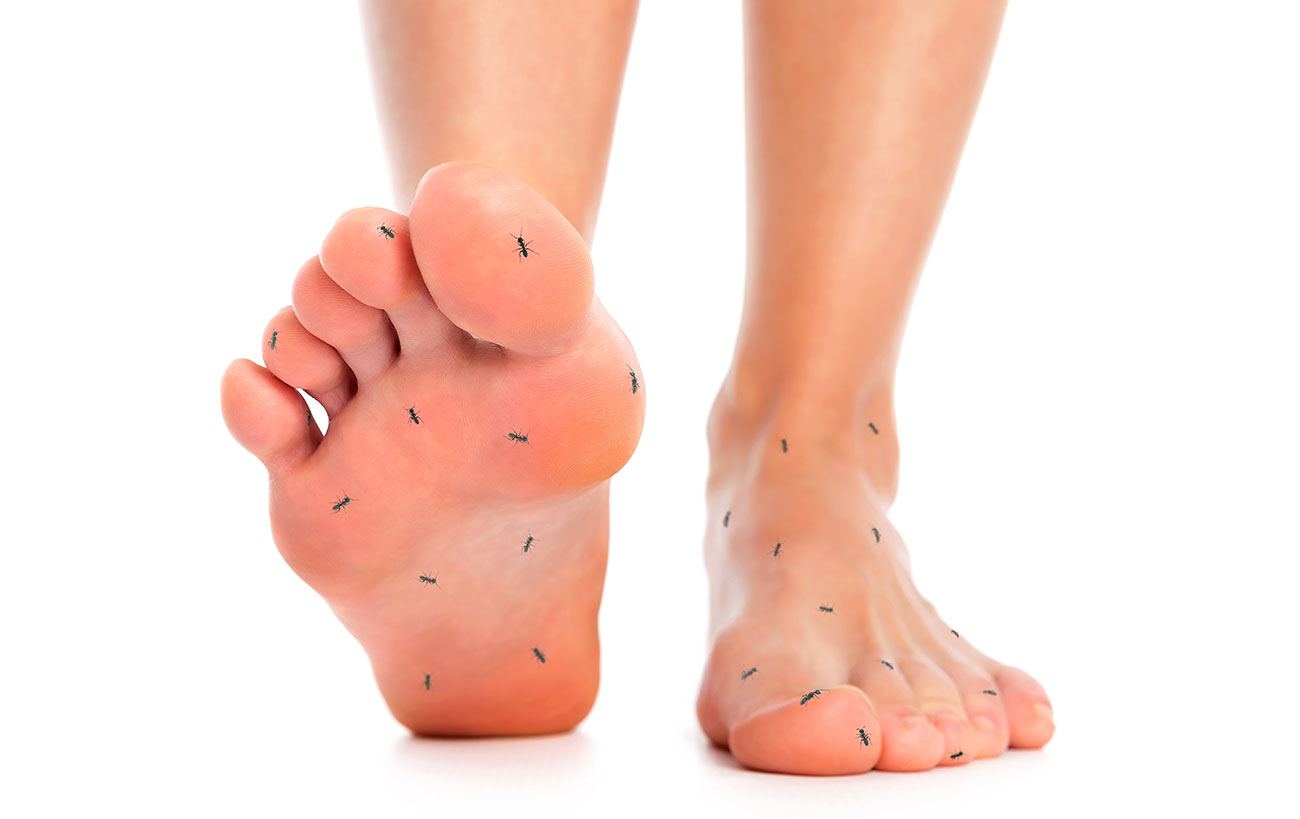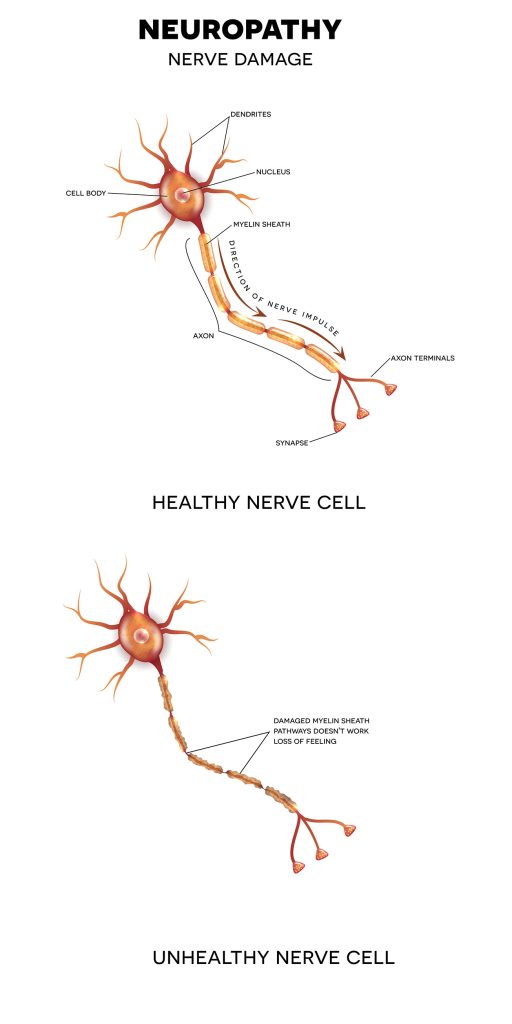 Peripheral neuropathy (PN) can be a frustrating, painful and relentless condition. Ironically, at its worst, the symptoms can include shooting or burning pain, or its opposite—complete numbness. And while peripheral neuropathy can go away, it’s frequently a chronic and progressive condition.
Peripheral neuropathy (PN) can be a frustrating, painful and relentless condition. Ironically, at its worst, the symptoms can include shooting or burning pain, or its opposite—complete numbness. And while peripheral neuropathy can go away, it’s frequently a chronic and progressive condition.
Peripheral neuropathy is also a big deal because it can lead to some serious complications. Not being able to feel your hands or feet may also mean that you can’t feel a burn or an injury when it’s happening in real time. Numbness also raises your risk of having a cut, infection or non-healing wound go unnoticed for longer than it should, which can slow healing time or develop into a serious health problem, especially if it’s complicated by diabetes. The lack of sensation and muscle weakness associated with peripheral neuropathy also increases your risk for falls.
What exactly is peripheral neuropathy? Neuropathy is a term to describe damage to your nerves, and peripheral means that the affected nerves are those outside of your brain and spinal cord. In most cases, peripheral neuropathy occurs in your hands and feet, but can extend into your lower legs and arms.
The symptoms of peripheral neuropathy can vary widely. That’s because your peripheral nervous system is made up of different kinds of nerves. These include sensory nerves that react to touch, temperature or pain; motor nerves that control your muscles; and autonomic nerves that oversee functions such as blood pressure, heart rate, respiration, perspiration and digestion.
If your sensory nerves are affected, you may experience numbness, tingling, a prickly sensation, hypersensitivity to touch and pain that can be sharp, burning, or throbbing. Sensory symptoms of peripheral neuropathy may also include experiencing pain during everyday activities, such as standing or walking and the sensation that your hands or feet are encased in mittens or socks. When your motor nerves are affected by this condition, symptoms may include muscle weakness, poor coordination, increased risk for falls and in severe cases, paralysis. Damage to the autonomic nerves can present as heat intolerance and extreme sweating or the inability to sweat. Systemically, autonomic nerve damage may also cause digestive, bowel or bladder issues.
Many people associate peripheral neuropathy with diabetes, for a good reason. Diabetes is the most common underlying cause of PN. Among people with Type 1 and Type 2 diabetes, more than half will develop some type of peripheral nerve damage. Other causes of peripheral neuropathy include:
- Some autoimmune conditions, such as lupus, rheumatoid arthritis, and Sjogren’s syndrome
- Viral or bacterial infections, including Lyme disease, hepatitis (B or C), Epstein-Barre virus and shingles
- Certain cancers and benign growths that impinge on peripheral nerves, as well as bone marrow and blood disorders
- Vitamin deficiencies, specifically B1, B6, B12, vitamin E and niacin
- Medications, most notably chemotherapy in the treatment of cancer
- Excessive alcohol use, which is associated with vitamin deficiencies and poor nutrition
- Exposure to toxic chemicals and heavy metals, including lead and mercury
- Trauma or injury that can impinge, damage or sever peripheral nerves. In addition, casting, the use of crutches and overuse can also cause nerve damage
- A family history of peripheral neuropathy or conditions that cause peripheral neuropathy can increase your risk
- In some instances of PN, there is no known cause
Treating Peripheral Neuropathy with Acupuncture
In some cases peripheral neuropathy is reversible. For example, if a nerve impingement or vitamin deficiency is corrected before nerves are severely damaged, symptoms may be reversed. However, in many instances peripheral neuropathy is a chronic and progressive condition. Standard treatment for this condition involves pain relief using a variety of medications including over-the-counter and prescription pain relievers, anti-seizure medications, tricyclic antidepressants and topical creams.
While standard care for peripheral neuropathy may paint a bleak picture, there is some good news in the form of acupuncture, the use of which for PN is backed up by scientific study. A review of fifteen research studies on treating peripheral neuropathy with acupuncture concluded that acupuncture is a beneficial treatment. The researchers reported that acupuncture appears to improve nerve conduction both in affected sensory and motor nerves.
Acupuncture works through a variety of mechanisms, which is why it can be effective in treating a wide range of health conditions. In treating peripheral neuropathy, acupuncture points are chosen to stimulate tissue near the damaged nerves. This increases circulation to the affected areas and stimulates the nerve pathways and damaged nerve fibers. In addition, acupuncture treatments trigger an increase in the circulation of certain neurotransmitters in the brain that regulate your body’s own opioid system to relieve pain.
If you choose to treat your peripheral neuropathy with acupuncture, your acupuncturist may opt to use electro acupuncture, in which a mild electrical current is passed through the needles to enhance their effect. In addition, they may offer dietary therapy and Chinese herbs to help address the underlying cause of your neuropathy and treat your symptoms.
The bottom line is that peripheral neuropathy is a painful condition that is often difficult to treat. However, acupuncture can be an important tool in helping to reverse this condition and relieving its symptoms. If you have peripheral neuropathy and are looking for relief, please contact our clinic today for more information.

